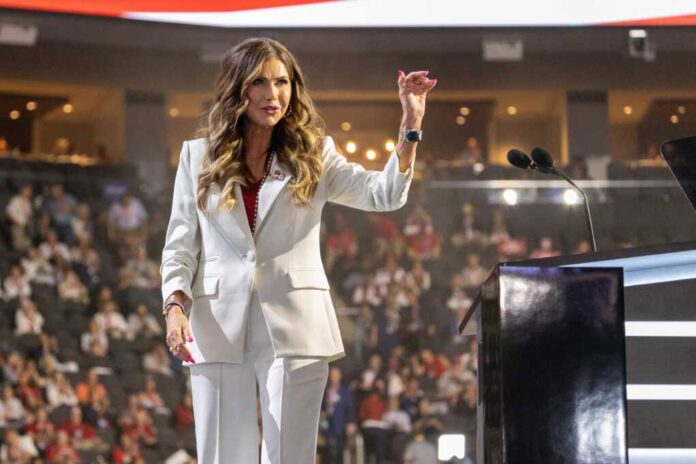
The debate over American citizen minors allegedly deported under the Trump administration reveals deeper media narratives and political tactics that shape public perception.
At a Glance
- Kristi Noem addresses claims about deporting U.S. citizen minors.
- Media narratives suggest children faced involuntary deportation.
- Parental decisions are cited as key in these deportation cases.
- Contentious media framing of immigration policies continues.
Parental Choices in Deportation Cases
The Trump administration’s immigration policies sparked intense debate, particularly around claims that American citizen minors were deported. Kristi Noem, the U.S. Department of Homeland Security Secretary, dismissed these claims as part of a “false media narrative.” She testified that deported noncitizen parents, not the administration, decided to take their children with them. In these cases, she insisted, no U.S. citizens were deported against their will, emphasizing the administration’s focus on maintaining family unity.
‘Will you deport US citizens?’: Kristi Noem & Rep. Escobar clash over Trump’s immigration policies
Noem further attested that her department’s commitment remains to secure borders while prioritizing the deportation of noncitizens involved in criminal activities. Media outlets, however, continue to press narratives of excessive harshness. Allegations of deporting minors persist, even when evidence suggests otherwise. Noem reaffirms her stance, denouncing such claims and reinforcing their unfounded nature, a perspective echoed by numerous conservative commentators.
— GodsWordSmith (@stevencbradley) May 5, 2025
Media Dynamics and Counter-Narratives
Amidst the debate, the role of media narratives became increasingly pronounced. While some outlets portrayed the Trump administration’s policies as unduly stringent, Kristi Noem disputed these characterizations. She emphasized that the administration’s objective was to offer voluntary departure options while maintaining pathways for legal re-entry. Yet, allegations about deporting young citizens remain a fixture in certain media narratives, showcasing the power of media framing in public discourse.
“The specific cases that you’re referencing with these children, it was the parents’ choice to take their children with them.” – Kristi Noem
Both Kristi Noem and Rep. Veronica Escobar, a Democrat, have dominated the discourse with their conflicting views, reflecting broader partisan divides over immigration. Critics argue that left-leaning media outlets sometimes overlook parental decision-making in these cases, though others point out that it would be difficult for deportees to leave their children behind, effectively removing choice. These dynamics not only shape policy understanding but also exert influence over public sentiment, perpetuating a polarized conversation on immigration.
Sec. Noem Destroys Fake News: ‘The Policy of the Trump Admin is to Keep Families Together’
Controversies and Clarity
These highly publicized claims and the ensuing debates expose the intricacies of America’s immigration policies and the narratives surrounding them. As media figures continue to scrutinize policies, it becomes apparent that broader issues related to partisanship and media framing remain deeply rooted. Noem’s clarifications aim to dispel widespread myths while addressing public concerns about the treatment of young citizens. Ultimately, the intersection of fact and interpretation underlies these contentious discussions.
The debate over deportations remains emblematic of larger issues about national security, parental rights, and media integrity. As both sides persist in this discussion, differing perspectives on the true intentions behind deportations illustrate a complex narrative shaped by various agendas. Amidst evolving stories and opinions, citizens must navigate the information landscape to discern the reality of immigration policies in the United States.





























